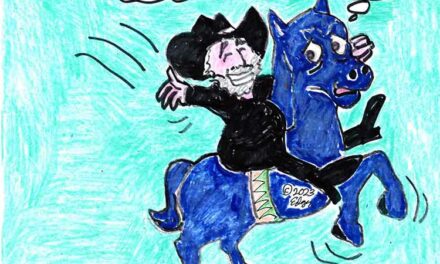Do We Really Need 24/7 “Breaking News”?
I’m as fascinated by Don Lemon’s eyebrows as you are, but, come on…
By Ed Goldman
I’ve decided that 24/7 newscasts on cable TV aren’t much different from the following assessment of Major League Baseball: “There are only 18 minutes of total action in an average baseball game,” according to a Snapple bottle cap, a usually reliable source.
The comment could have gone on to say that those 18 minutes of action get crammed into more than three hours—but how much verbiage can one squeeze into the average bottle cap, which has a diameter of only 1.17 inches? (And in case you’re wondering, the cap’s info came from PolitiFact, an actually reliable source.)
Getting back to wall-to-wall cable news: With the exception of continuously unfolding stories, such as 9-11 and the Black Lives Matter protests, both of which had global implications—but definitely not the pursuit of O.J. Simpson’s white Bronco a little more than 26 years ago, which had only ratings implications—is there really that much going on every day and night that we need dawn-to-nite-nite-time coverage of it?
On cable TV, almost every half-hour segment begins with the term “Breaking News.” This certainly used to get my attention, just as newsies did when I was a kid in New York, as they stood on street corners displaying the front page of a newspaper’s latest edition and yelling “Extra! Extra! Read all about it!” (For some reason, many of these entrepreneurial kids used to scream “Extree! Extree!” This sounded less like a street-smart kid in a snap-brimmed cap than like a toothless rural stereotype from a 1930s movie. But I digress.)
Cable’s “breaking news” reminds me of the story of the little boy who cried Wolf Blitzer. The stories rarely break anything other than one’s concentration or spirit by over-promising but under-delivering something momentous instead of something merely momentary.
Many local TV newscasts have a similar business model though at least that car crash or arrest that opens the show happened in our own neighborhood and possibly to our own neighbors. But, like habitually reading obituary notices in the newspaper, nothing of much use is learned; oh, we occasionally get something to talk about, even if we don’t know any of that day’s deceased, but for all except the directly affected—the family and friends of the deceased, plus the deceased themselves—our attention wanders to something else within a day or two.
I can’t watch Fox News at all, except as an anthropological experiment (“In the early 21stcentury, American currency turned from paper, coins, credit and bitcoins to overheated promos and bald-faced lies”). And I like some of the newscasters on CNN (Jake Tapper, Anderson Cooper and the aforementioned Wolf Blitzer come to mind). But I have to turn off the TV or switch to watching one of the 36 daily “Law and Order” reruns on various channels when Don Lemon or Chris Cuomo come on, both of whom use the camera as a mirror not of society but of their own facial expressions. What narcissistic gasbags—though I do admire the carefully crafted symmetry of Lemon’s eyebrows and the expressiveness of Cuomo’s I-just-worked-out-and-you-didn’t Adam’s apple.
I do think Cuomo may have inadvertently performed a valuable public service when he narrated his own Covid-19 infection and recovery while still delivering the news from the basement of his home. Seriously. I’ll bet it comforted a lot of people who’d been fretting that a positive diagnosis was the equivalent of a death sentence. It was still all about him, of course, but in this case, viewers could relate. The pandemic was all about them.
As you know, cable TV has managed to re-kindle a spark of relevance for, if not quite revive the careers of, erstwhile Nixon White House counsel John Dean, newsman-turned-blunderbuss Dan Rather and swashbuckling journalist Carl Bernstein. They’re among the more informed talking heads who bobble their way onto our screens whenever Washington, DC corruption leads that day’s newsfeed and someone equates Donald Trump with Richard Nixon and everything else with Watergate.
Speaking of Watergate, I sometimes wonder what it would’ve been like had 24/7 cable news been around in the early 1970s for the hearings, led by U.S. Senators Sam Ervin, a Democrat (and in his younger years, a defender of Jim Crow laws—oh, yes) and Howard Baker, a Republican. It made for riveting and surprisingly less-partisan television than I’d have thought possible—maybe because almost everyone wanted to see Nixon impeached, convicted and removed from office and, unlike what happens with Trump, no one was scared of angering the president.
Ed Goldman's column appears almost every Monday, Wednesday and Friday. A former daily columnist for the Sacramento Business Journal, as well as monthly columnist for Sacramento Magazine and Comstock’s Business Magazine, he’s the author of five books, two plays and one musical (so far).











